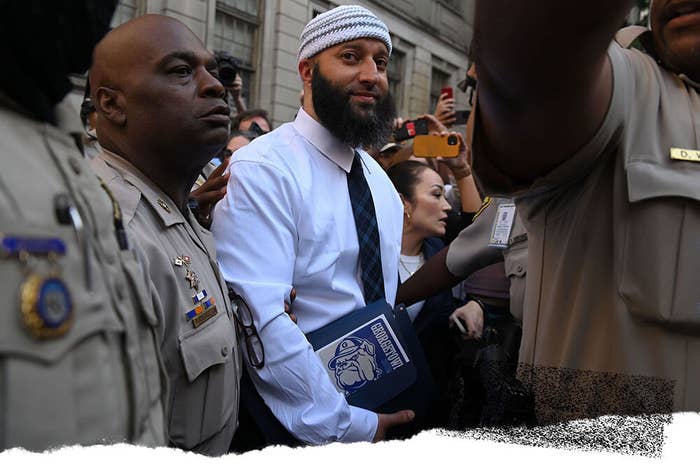
One of the biggest stories in the past month has been the bombshell release from prison — and subsequent exoneration — of Adnan Syed, whose 2000 conviction for the murder of his ex-girlfriend Hae Min Lee was the subject of the massively popular and influential Serial podcast. While Serial didn’t create the insatiable appetite for true crime content, its record-breaking success inspired countless other podcasts and documentaries. Most significantly, it bolstered the efforts of Syed’s supporters, from his advocate Rabia Chaudry — who originally brought the case to Serial host Sarah Koenig — to armchair detectives who analyzed every detail of the investigation.
A judge tossed out Syed’s conviction because of prosecutors’ failure to inform his defense team about two “alternative suspects,” among other concerns about the reliability of evidence presented at his original trial, and the Baltimore state’s attorney decided not to pursue a new trial because newly tested evidence did not contain Syed’s DNA.
Defense attorneys have since said they’ll begin the process to get Syed certified as innocent, something his many defenders believe is decades overdue. In spite of this, others who have followed the case believe that if there were a new trial — without the failures of the original process — a jury could still rule to convict Syed. Here are some reasons why:
Syed’s story was inconsistent: Jay Wilds, the prosecution’s primary witness and the one who initially told police where to find Lee’s car, changed his story repeatedly, both during initial questioning and in post-Serial interviews. (He pleaded guilty to accessory after the fact for helping to bury Lee’s body and served no prison time.) But Syed’s story changed too.
As a refresher: According to prosecutors at trial, Syed planned the murder by asking Lee — in a midnight call the night before — for a ride after school and killed her in the car at a nearby Best Buy parking lot. In addition to denying that he killed Lee, Syed has denied asking for a ride or being in her car; in his 2014 Serial interview Syed said, “I wouldn’t have asked for a ride after school. I’m sure that I didn’t ask her because, well, immediately after school because I know she always‚ anyone who knows her knows she always goes to pick up her little cousin, so she’s not doing anything for anyone right after school. No matter what. No trip to McDonald’s. Not a trip to 7-Eleven. She took that very seriously.”
However, in 1999, his defense attorney’s law clerk wrote in a memo that Syed said the couple in fact regularly had sex in the Best Buy parking lot before Lee picked up her cousin. Specifically, the clerk wrote that Syed told her, “They also frequented the Best Buy parking lot next to Security Square Mall (this was their designated spot when school started). … Since Hae was responsible for picking up her niece after school, they would have sex in the Best Buy parking lot close to the school after school. Hae would leave to get her niece and they would see one another that night.”
In Serial, Koenig omitted a startling detail from Lee’s diary: “Hae does not describe Adnan as overbearing or possessive in her diary,” Koenig says in Episode 2 as she discusses how prosecutors portrayed him as possessive and controlling. In fact, Lee complained specifically about Syed’s “possessiveness” in her diary: “The second thing is the possessiveness,” Hae writes after first complaining that Syed had called her a “devil” because she’s “against his religion”: “I’m a very independent person. I rarely rely on my parents. Although I love him, it’s not like I need him. I know I’ll be just fine without him.” Lee followed that by complaining about Syed’s “jealousy” and “mind games.”
It didn’t snow on Jan. 13, 1999: Asia McClain said she saw Syed in the school library during a crucial time period, but that alibi is potentially questionable. On Serial, for example, McClain said, “I would not have remembered if not for the snow,” adding that it “was the first snow of the year.” In fact, as Serial noted on its website after the episode aired, not only did it not snow on Jan. 13, but the first snow of that year was Jan. 8 — and the school was closed because of the dangerous weather. Furthermore, Syed never told police or his own attorneys about the library when he recounted details of where he was on the day Lee was murdered — or any other day. Finally, a classmate of McClain’s and the classmate’s sister later said that she had offered to lie about Syed being in the library.
People have relitigated the case in other podcasts (like Chaudry’s Undisclosed), blogs, books, and Reddit forums, and they likely will continue to do so even if someone else is found guilty of killing Lee. The DNA belonging to four people found on a pair of Lee’s shoes recovered from her car did not belong to Syed, Lee, or Wilds, but Baltimore State’s Attorney Marilyn Mosby has not yet said whether it matches the two newly disclosed “alternative suspects” in the case, which she said is still “open and pending.”
For now, Syed has had his guilty verdict vacated, but it remains to be seen if his innocence will be certified. If so, the Baltimore Sun reported, he could be eligible for wrongful conviction compensation totaling more than $2 million.

